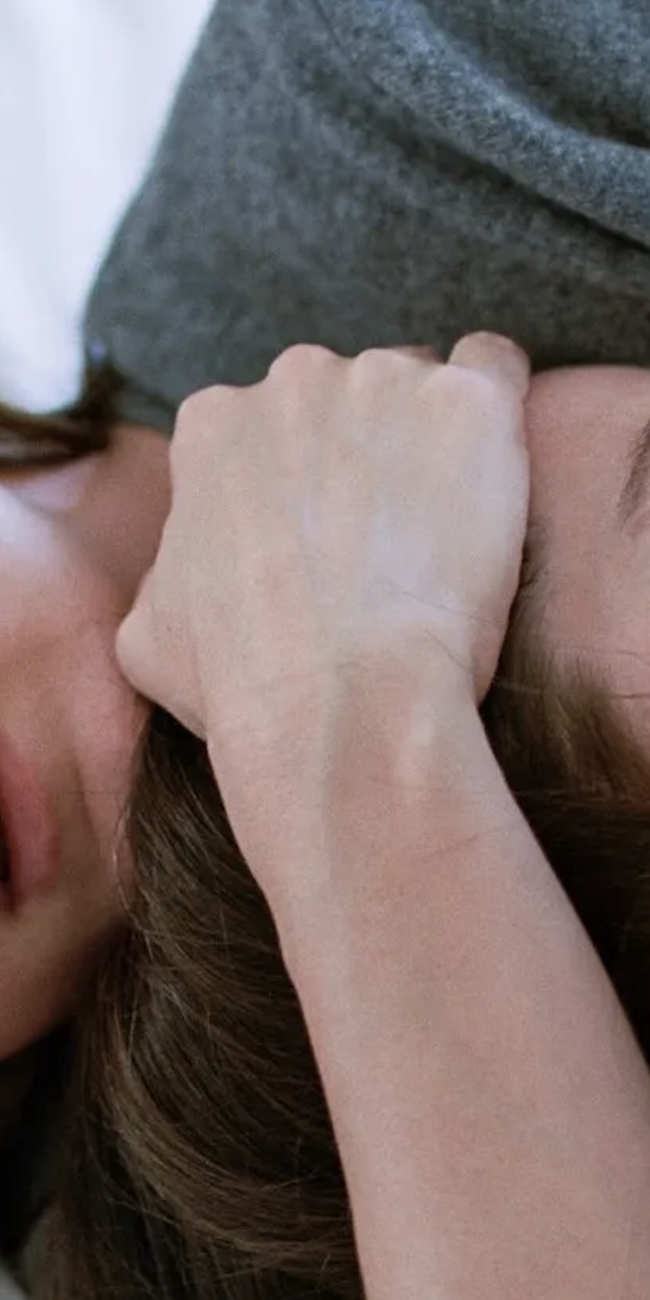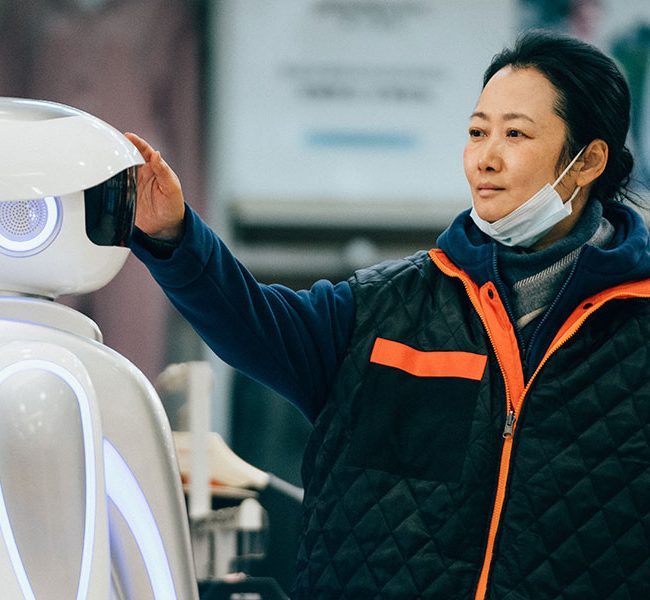A Conversation with Paprika Steen and Sofie Gråbøl (THAT TIME OF YEAR)
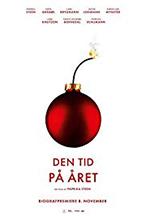 I met with director/star Paprika Steen and supporting actress Sofie Gråbøl on Saturday, September 8, 2018, at the Toronto International Film Festival, to discuss their collaboration on Steen’s That Time of Year (which I also reviewed), which premiered at the fest. The movie tells the story of a fraught family reunion at Christmas, and Steen (Silent Heart) and Gråbøl (Sarah Lund in the original Danish version of The Killing) play sisters caught in a longstanding rivalry. It’s a simultaneously melancholy and bitterly humorous affair. Here is a condensed digest of our conversation, edited for length and clarity.
I met with director/star Paprika Steen and supporting actress Sofie Gråbøl on Saturday, September 8, 2018, at the Toronto International Film Festival, to discuss their collaboration on Steen’s That Time of Year (which I also reviewed), which premiered at the fest. The movie tells the story of a fraught family reunion at Christmas, and Steen (Silent Heart) and Gråbøl (Sarah Lund in the original Danish version of The Killing) play sisters caught in a longstanding rivalry. It’s a simultaneously melancholy and bitterly humorous affair. Here is a condensed digest of our conversation, edited for length and clarity.
Hammer to Nail: So, Paprika, this is not your first directing gig. Could you talk about what it’s like transitioning from in front of the camera to behind the camera, going from actor to director?
Paprika Steen: And then doing both?
HtN: And then doing both in the same film.
PS: I think that for my two first features, I just felt it was like an extension of my work as an actress. I wasn’t fulfilled enough just doing the acting. You know, I’ve always been a great admirer of Chaplin, and I always thought it must be amazing to be able to hold all the threads and be your own artistic dictator. (laughs) So it always interests me, and if you ask Sofie, she would say, oh, finally you got paid for what you’re doing anyway when you’re not directing, because I’m always directing. I dug myself into this kind of acting ditch when I was very young. So I needed to get out of that and look at it from another perspective…so I started directing.
From the first 2 features to now, it’s been 11, 12 years, because, with my last feature, I thought it was so hard, not the artistic work, but everything else around it, so I got kind of stressed out. And then I thought, “Why should I ever make a movie again because all movies in the world have been done 15 million times?” and my ex-husband, who was also my producer, came and kicked my ass and said, “You should not waste your talent. Do a movie!” And I said, “OK.” “But what do you want to do a movie about?” “Oh, I want to do the thing that nobody wants to see. I want to do something about a family, a middle-class family on Christmas Eve, so bourgeois that you would hate it.” And he’s like, “No, no! Everybody’s going to want to watch that.” So I did it. I did it.
HtN: Well, I very much enjoyed it.
PS: Thank you.
HtN: So, how did you cast this film, with Sofie and then the children? In particular, the young girl who plays Leah is just amazing.
PS: Yeah, she’s amazing. She’s kind of a little chubby Elle Fanning when she was a kid.
HtN: (laughs) Fanning just walked by me a few minutes ago, outside.
PS: Yeah? So, all the adult actors I had in mind from the beginning. I always start with putting pictures of everybody I want to work with, and so there were really a lot of actors I wanted to work with, so I had to put them all in my movie. I specifically wanted to work with Sofie and Lars, who plays her husband, because we’ve been working together on and off over the years and I so admire her work and I admire her as a person and she’s very helpful to me as a director because she’s very analytical and very supportive of what you do, and I just…she’s a great artist, I think. That’s why. And I thought it was fun to play her sister, because I always thought there was some kind of weird twin flame between us, and I don’t know why. She’s like a size zero and I’m a size 140, and she’s an introvert and I’m an extrovert, but there was something about it that is just…we’ve always liked each other very much. And we don’t see each other every day, but we just really like each other.
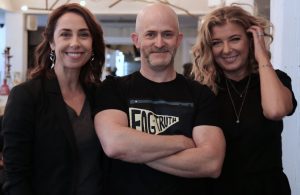
Sofie Gråbøl, our Chris Reed and Paprika Steen
HtN: Well, that definitely comes across in the film. There’s a real comfort level among the ensemble, but I’m just curious at how you rehearsed. Did everyone know each other beforehand? What kind of rehearsal process…
PS: It’s Denmark.
HtN: So that’s why? Because it’s Denmark?
PS: And for the kids, I just want to say, I cast a lot of kids and I just found them through casting.
HtN: So how did you…did you spend a lot of time rehearsing? How much of that was just through rehearsing or improvisation? Sofie, could you talk about the rehearsal process on your end?
Sofie Gråbøl: We didn’t really…we had some talks sitting around a table with the script. I think there’s only one scene Paprika chose to literally rehearse and block.
PS: It’s the kitchen when everybody arrives, we have the whole group coming the first time in a very small room.
HtN: That’s a great scene! I like that scene a lot.
PS: Yeah, I was watching old footage of Francis Ford Coppola when he does the wedding scene in The Godfather, and I was thinking, this is how I want to do it. I want to be like…it’s almost like a play, but it’s not a play. How do you transform the kind of play that it is into a movie? Because I don’t want to make a play that would just…the camera’s up and then it’s theater, but with pictures. I wanted to make a real film. So that’s how we started out doing that scene, and I really blocked it very thoroughly. And then we were supposed to have two cameras, but the room was so small, so we could only put one camera in there.
So that was thorough, I mean, it was a long day, because I was like you put the pan there, then you go over there, and you say that line, so it’s very composed and choreographed, actually, even though it looks…But at the end of the scene, I wanted one character to come back, a very boring character to come back and terrorize us with boring stores, because when you’re really stressed and somebody talks to you for five minutes about something you’re really not interested in … so I added on a little bit of improvisation with the guy who plays Sofie’s husband, but that was at the end of the day. It was just an idea I got.
HtN: But beyond that scene, you’re saying that everything was much more improvised and loose?
SG: No, no, no, no, no, no! No, it wasn’t improvised.
PS: There was a script.
SG: But we just didn’t…when you say rehearse, you mean literally rehearse?
HtN: Well, because there’s just such a comfort level among everyone…
SG: Yeah, but I think that’s partly…well, on one hand, it’s a small country, so we do know each other, so we can skip all the “hello, how are you,” so there is this family feeling that we very quickly got to. But I think also, for everyone, it’s very luxurious as an actor to have a director who is also an actor, because Paprika has always had a very sharp…she’s extremely bright, she’s extremely fast…
PS: [makes a demurring sound]
SG: No! You are! And to have a director who knows … she’s so hands-on, so she won’t just say, can you turn it up or down? She’ll be very specific, and then suddenly that’s your tool to make the scene work. She’s very concrete, and what she’s also very good at is spotting, which is painful sometimes, spotting your sleepwalking routines that we all get as habits. I always do that without thinking because it works, and then someone comes and says, can I have that crutch? And you suddenly have to actually find out where you stand and how you stand. [to Paprika] You’re very good at that.
PS: I look at everything going on.
HtN: I’ve talked to other directors who’ve been in front of the camera as well, and they usually have somebody watching their performance for them to give them notes. Did you have…
PS: I had a technical director, but not for me. Just for everything. I mean, just because I couldn’t have 15 people in a room all the time, and…I know what I wanted to do. I know the part. And I don’t really need that. Sometimes I asked my fellow actors, is this too much? Is it too…[to Sofie] Are you laughing?
SG: No, I just wanted to say, just to finish that, what surprised me was that the one who was thrown wasn’t Paprika. I was worried about Paprika. Is she going to be able to handle all these different mindsets? She didn’t have a problem for a second. But me, when you do a scene with Paprika and you’re acting, and she was my sister, and we’re playing this scene, and she would just surf in between like a slalom skier, in between lines and directions. That would sometimes throw me.
PS: Like in the middle of a scene.
SG: When you have a dialogue and she suddenly says, run that line again. Go back two lines. Okay, sit.
HtN: The wearing of the two hats at once.
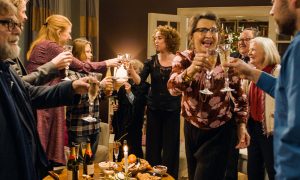
A still from THAT TIME OF YEAR
SG: Yeah. She was just wearing them on top of each other.
PS: And I know the material so well. Sometimes I was stressed, but I don’t know, I had a good backup.
HtN: Well, speaking of knowing the material really well, I like your circular device of the opening and closing overhead shots. I don’t know if you used a drone or something else for those.
PS: The last one?
HtN: But you open also with…
PS: Yeah, it’s a drone.
HtN: So, was that all part of the plan, to sort of start and stop that way?
PS: I started out having my last shot in the movie, which I can’t tell you right now, because that’ll spoil it. But it was like a crane shot, and then I have this gadget-freak DP [Director of Photography], who wanted to do a drone, which we were arguing about, because when I saw it, I’m like, I don’t like drones. I’m so old school. I like 35mm. For me, it’s like, the last movie I did was on 35…but I ended up liking it.
HtN: Well, it’s nice, and I’ve heard people describe drones, when used that way, as a tripod in the sky. You just get that nice overhead shot. So, I have one last question: I haven’t seen a lot of your work, but I’ve seen enough to know how much I appreciate you as an actress. I really loved you in Applause, and of course I loved you in Celebration. And I’m wondering, as they’re all fraught family dramas, is this a genre that you are, in general, attracted to?
PS: Yes.
HtN: I mean, it’s a fascinating genre, for most of us, because most of our families are fraught, right?
PS: I’m fascinated by two things. First, I love the old ’70s kind of movies. Some of my favorite scenes in history are the wedding scene in The Godfather, the whole of American Graffiti, you know, a lot of people coming together and doing stuff that is bound to some kind of tradition, or they meet at diners, I love that. And then I also love when everybody’s important and nobody’s important in a scene. I’m a huge Altman fan, and Coppola, of course, so I’m also…I’m kind of old school that way. And I believe that when everything else is dying out, and you have 4K, 5K, 8K, whatever, Avatar, it will still be that character-driven kind of emotional drama or comedy that will still talk to you as an audience. And that’s why I want to refine that until I die.
I think I’m never going to make an action film, maybe action, but not like…I’m not a gadget freak. I’m not a technical nerd. I love beautiful shots. But I am old school, and I think that if you can make the dialogue that quick and that fast as I do in this movie…it’s so much that I can’t even translate everything in subtitles and when I do my English version of this, you’ll find out how many…it’s also like a shootout. Because I’m over that part where we have to sit in front of each other and feel a lot and say one line in an hour. I’m past that. We’re a very verbal culture, and I want to portray that.
HtN: Well, I think you do a wonderful job with the film. I really enjoyed it. Thank you both so much.
PS: Thank you.
SG: Thank you.
– Christopher Llewellyn Reed (@ChrisReedFilm)








